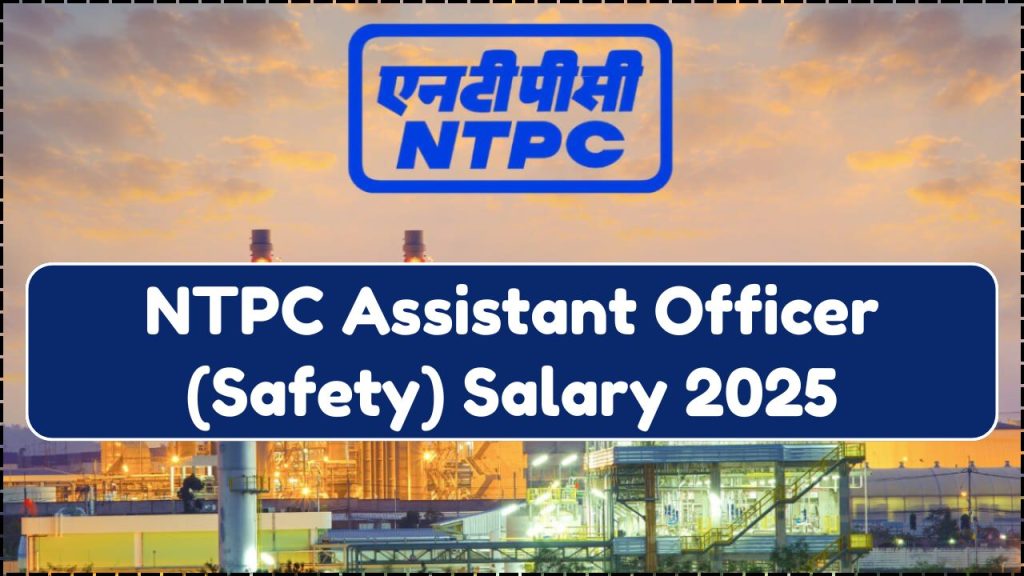
The National Thermal Power Corporation (NTPC) stands as one of India’s most respected public sector enterprises, offering promising career opportunities for professionals across various domains. Among the most sought-after positions is that of Assistant Officer (Safety), a role that combines professional growth with meaningful contribution to workplace safety standards.
If you’re considering a career with NTPC or looking to understand what this position offers, this comprehensive guide covers everything from salary details to career progression opportunities.
Why Choose NTPC as Your Career Destination
NTPC has built its reputation as a stable and prestigious organization that values both employee welfare and professional excellence. Working with NTPC means joining a company that prioritizes safety, offers substantial growth opportunities, and provides a comprehensive benefits package that extends well beyond just salary.
The organization’s commitment to maintaining high safety standards makes the Assistant Officer (Safety) position particularly important. This role doesn’t just offer job security; it provides a platform to make a real difference in creating safer work environments while building a rewarding career.
What sets NTPC apart is its structured approach to employee development. The company has established clear career pathways, regular training programs, and a culture that encourages professional growth. For someone starting as an Assistant Officer (Safety), the journey ahead includes multiple opportunities for advancement and skill development.
Understanding the Salary Structure
The salary package for NTPC Assistant Officer (Safety) positions reflects the company’s commitment to attracting and retaining quality talent. The compensation structure is designed to be competitive while offering stability and growth potential.
Basic Salary Range
| Component | Amount Range |
|---|---|
| Monthly Basic Pay | Rs 30,000 – Rs 1,20,000 |
| Starting Take-Home Salary | Around Rs 30,000 |
| Pay Scale Growth | Based on grade, performance, and experience |
The wide salary range indicates the potential for growth within the position. Recruits typically start at the lower end of the scale, with substantial room for increases based on performance, experience, and career progression.
Complete Salary Breakdown
| Salary Component | Details |
|---|---|
| Basic Pay | Rs 30,000 – Rs 1,20,000 per month |
| Dearness Allowance (DA) | Adjusted periodically to counter inflation |
| House Rent Allowance (HRA) | Varies by posting location |
| Medical Benefits | Comprehensive health coverage for employees and their families |
| Performance Incentives | Merit-based rewards |
| Additional Benefits | Travel allowances, leave benefits, retirement plans |
The actual take-home salary depends on several factors, including the employee’s grade level, posting location, and applicable deductions. However, the starting in-hand salary of around Rs 30,000 provides a solid financial foundation, with regular increments and performance-based additions enhancing the overall package.
Comprehensive Benefits and Allowances
Beyond the basic salary, NTPC offers an extensive benefits package that significantly adds to the overall value of the employment offer. These benefits are designed to support employees’ professional and personal well-being.
Healthcare and Family Benefits
NTPC provides comprehensive medical coverage that extends to employees’ families. This includes regular health check-ups, medical emergencies, and ongoing healthcare needs. The coverage helps employees focus on their work without worrying about healthcare expenses for themselves or their loved ones.
Housing and Location Benefits
The House Rent Allowance (HRA) varies depending on the posting location, with higher rates for metropolitan areas and adjusted rates for smaller cities. Some employees may also have access to subsidized company accommodation, which can significantly reduce living expenses.
Performance and Recognition
Performance incentives form an important part of the compensation package. These are awarded based on individual achievements, team performance, and contribution to the company’s safety objectives. Regular performance evaluations ensure that dedicated employees receive recognition and financial rewards for their efforts.
Work-Life Balance Support
NTPC understands the importance of maintaining a healthy work-life balance. Employees receive adequate paid leave, travel allowances for work-related travel, and various other benefits that support personal time and family commitments.
Job Responsibilities and Daily Work
The Assistant Officer (Safety) position involves critical responsibilities that directly impact workplace safety and regulatory compliance. Understanding these responsibilities helps potential candidates prepare for the role and current employees excel in their duties.
Primary Safety Functions
As an Assistant Officer (Safety), you’ll be responsible for developing and implementing comprehensive safety protocols. This involves analyzing workplace hazards, creating preventive measures, and ensuring that all safety procedures are followed consistently across the organization.
Regular safety audits form a crucial part of the role. These audits include fire safety evaluations, equipment safety checks, and overall workplace safety assessments. The findings from these audits help identify potential risks and areas for improvement.
Regulatory Compliance and Standards
Staying updated with government regulations and industry safety standards is essential. The role requires ensuring that all safety measures meet legal requirements and industry best practices. This involves continuous learning about evolving safety regulations and implementing necessary changes.
Training and Education
Leading employee training sessions and conducting emergency drills are important aspects of the position. These activities help build a strong safety culture throughout the organization and ensure that all employees are prepared to handle emergency situations effectively.
Incident Management
When safety incidents occur, conducting thorough investigations becomes a priority. This includes analyzing root causes, documenting findings, and implementing corrective measures to prevent similar incidents in the future.
Career Growth and Advancement Opportunities
NTPC offers structured career progression that allows employees to advance based on performance, skills, and experience. The career path for Assistant Officer (Safety) positions includes multiple levels of advancement.
Career Progression Path
| Position Level | Typical Experience Required | Key Responsibilities |
|---|---|---|
| Assistant Officer (Safety) | Entry level | Basic safety protocols, audits, training |
| Senior Officer | 3-5 years | Advanced safety management, team leadership |
| Chief Fire & Safety Officer | 7-10 years | Strategic safety planning, department management |
| Higher Administrative Roles | 10+ years | Policy development, organizational safety strategy |
Professional Development Support
NTPC invests heavily in employee training and development. Regular workshops, certification programs, and skill enhancement courses ensure that employees stay updated with the latest safety technologies and practices. This continuous learning approach not only benefits individual career growth but also enhances overall organizational safety standards.
Leadership Development
As employees progress in their careers, they take on increasing leadership responsibilities. This includes managing safety teams, participating in strategic decision-making, and influencing organizational safety policies. The company provides leadership training and mentoring to support this transition.
Educational Requirements and Qualifications
To qualify for the Assistant Officer (Safety) position, candidates typically need a relevant educational background combined with practical experience or certification in safety management.
Educational Background
A degree in safety management, engineering, or a related technical field is generally required. Specialized courses in fire safety, industrial safety, or occupational health and safety can strengthen an application significantly.
Professional Certifications
While not always mandatory, professional certifications in safety management can enhance career prospects. Certifications from recognized institutions in areas like fire safety, industrial hygiene, or safety management systems are valued by employers.
Experience Requirements
Previous experience in safety-related roles, whether in industrial settings, construction, or other relevant fields, can be advantageous. Even entry-level positions benefit from any practical exposure to safety procedures and protocols.
Application Process and Selection
Understanding the application and selection process helps candidates prepare effectively for NTPC recruitment.
Application Requirements
Applications typically require submission of educational certificates, experience letters, and other relevant documentation. Ensuring all documents are complete and properly formatted is important for a successful application.
Selection Process
The selection process usually involves written examinations, technical interviews, and sometimes practical assessments related to safety knowledge and procedures. Candidates should prepare by reviewing safety regulations, NTPC’s safety policies, and current industry practices.
Future Outlook and Industry Trends
The role of safety professionals in organizations like NTPC continues to evolve with changing technology and regulations. Understanding these trends helps in career planning and skill development.
Technology Integration
Modern safety management increasingly incorporates digital tools, data analytics, and automated monitoring systems. Staying updated with these technological advances can enhance career prospects and effectiveness in the role.
Regulatory Evolution
Safety regulations continue to evolve, requiring ongoing learning and adaptation. Professionals who stay ahead of regulatory changes and contribute to policy development often find enhanced career opportunities.
Making the Decision
Choosing to pursue a career as an Assistant Officer (Safety) with NTPC offers a combination of financial stability, professional growth, and the opportunity to make a meaningful impact on workplace safety. The role provides a solid foundation for building a rewarding career in safety management while working with one of India’s premier public sector organizations.
The comprehensive benefits package, structured career progression, and commitment to employee development make NTPC an attractive employer for safety professionals. For those passionate about creating safer work environments while building a stable career, this position offers an excellent opportunity to achieve both professional and personal goals.
Whether you’re a recent graduate or an experienced professional looking for career advancement, the Assistant Officer (Safety) position at NTPC provides a platform for growth, learning, and meaningful contribution to organizational success.

Katherine Johnson is a passionate writer with a keen interest in storytelling, content creation, and creative expression. She enjoys exploring diverse topics and crafting engaging narratives that captivate readers.



